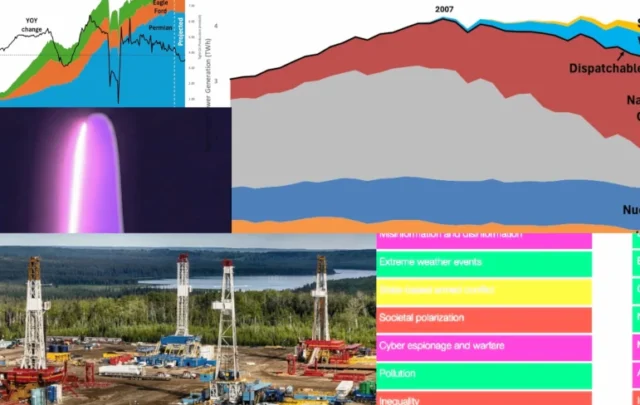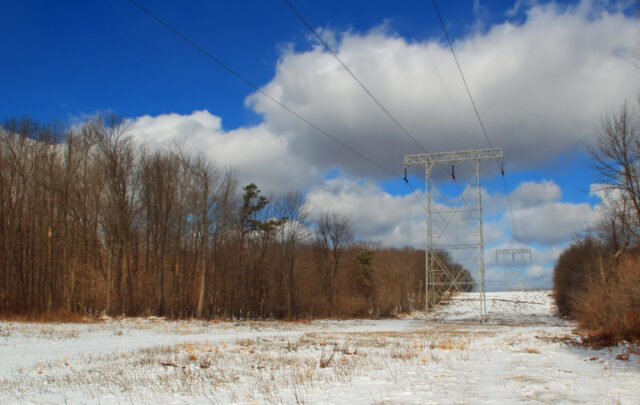

NOTE: Images in this archived article have been removed.

Pumpjacks image via shutterstock. Reproduced at Resilience.org with permission.
Perhaps you’ve seen one of the recent barrage of articles claiming that fears of an imminent peak and decline in world oil production have either been dispelled (because we actually have plenty of oil) or are misplaced (because climate change is the only environmental problem we should be concerned with). I’m not buying either argument.
Why? Let’s start with the common assertion that oil supplies are sufficiently abundant so that a peak in production is many years or decades away. Everyone agrees that planet Earth still holds plenty of petroleum or petroleum-like resources: that’s the kernel of truth at the heart of most attempted peak-oil debunkery. However, extracting and delivering those resources at an affordable price is becoming a bigger challenge year by year. For the oil industry, costs of production have rocketed; they’re currently soaring at a rate of about 10 percent annually. Producers need very high oil prices to justify going after the resources that remain—tight oil from source rocks, Arctic oil, ultra-deepwater oil, and bitumen. But oil prices have already risen to the point where many users of petroleum just can’t afford to pay more. The US economy has a habit of responding to oil price hikes by swooning into recession, and during the shift from $20 per barrel oil to $100 per barrel oil (which occurred between 2002 and 2011), the economies of most industrialized countries began to shudder and stall. What would be their response to a sustained oil price of $150 or $200? We may never know: it remains to be seen whether the world can afford to pay what will be required for oil producers to continue wresting liquid hydrocarbons from the ground at current rates. While industry apologists who choose to focus only on the abundance of remaining petroleum resources claim that peak oil is rubbish, the market is telling Houston we have a problem.
Meanwhile some environmentalists have abandoned the subject of peak oil because they believe it’s just not relevant. For them, climate change is the only thing that matters. Society must deal with its collective carbon habit by going cold turkey on all fossil fuels. We can make the needed energy transition through the strategies of substitution and efficiency. Develop low-carbon energy sources (solar and wind, possibly nuclear), and use energy smarter! Electrify transport with battery-powered cars! Get with the program and stop wasting time on side issues!
Like the abundant-resource argument, this line of thinking proceeds from an unassailable premise. Anthropogenic climate change is indeed the nastiest, gnarliest environmental issue humanity has ever faced. The potential consequences stretch centuries or millennia into the future and imperil not just humanity, but thousands or millions of other species. But peak oil won’t go away just because it’s an inconvenient distraction from addressing that gargantuan issue. In fact, the two problems are closely linked and society will need to address both by way of a realistic, comprehensive strategy. I’ll get back to that point toward the end of this essay.
Is the necessary transition to renewable energy a simple matter of politics and regulation, as many climate campaigners seem to suggest? Hardly. Transitioning the electricity sector is a huge task in itself (the variability of wind and solar power implies soaring costs for energy storage, capacity redundancy, and grid upgrades once these sources start to provide a substantial portion of total electrical energy consumed). But liquid fuels pose an even bigger hurdle. Even the most advanced batteries do a poor job of storing energy when compared to oil; that’s why we’re unlikely ever to see electric airplanes, tractors, ships, 18-wheel trucks, or bulldozers. Some energy pundits tout compressed natural gas as a viable bridge fuel for transport, but that assumes sufficient availability and continued affordability of fracked shale gas—a prospect that seems highly unlikely in view of the results of Post Carbon Institute’s ongoing research into possible shale gas drilling locations and per-well production profiles. Hydrogen could be a niche fuel in some instances, but conversion from other energy sources (electricity or natural gas) to hydrogen implies energy losses, as does hydrogen storage. Further, if we were to make lots of H2 from water, using electricity, in order to fuel much of the transport sector, this would place an enormous extra burden on solar and wind, which already face a daunting job replacing coal and natural gas in the power generation sector.
How about energy efficiency? Good idea! We need to cut energy waste, and the folks at Rocky Mountain Institute have proposed many good ways of doing that. But, at the end of the day, efficiency is subject to the law of diminishing returns; so, while the tie between energy consumption and economic output is somewhat elastic, it cannot be severed. Specifically regarding oil: yes, many nations have reduced petroleum consumption in the last few years as a way of adapting to higher prices. But the fact that their economies have weakened suggests that efficiency gains have tended to lag behind oil price increases. Average vehicle fuel economy has improved, but not fast enough—so our main “efficiency” strategy has in reality simply been to travel less, and then deal with the withdrawal of economic benefits that cheap transport formerly provided.
None of this is trivial: oil is essential to the functioning of the modern industrial world. We use it for just about all transportation, which is key to trade. It’s also the fuel for construction, resource extraction (mining, fishing, forestry), and agriculture. Together, these sectors form the backbone of the real, physical economy of industrialized nations.
Again: the costs of oil production are rising and oil is stubbornly hard to substitute. As I argued in a recent book, this effectively spells the end of the historic period of rapid economic growth that began shortly after World War II. There is no way out; inevitably, society will become less mobile and—this should be cause for much greater concern—it will either produce less food or produce it in more labor-intensive ways.
Of course, peak oil and climate change aren’t the only looming challenges we should be concerned about. Economists rightly worry that the world is mired in far too much debt. Ecologists warn us about biodiversity loss, pervasive chemical pollution, and human overpopulation. Food system analysts try (usually in vain) to direct public attention toward the predicaments of topsoil degradation and depletion of aquifers from over-irrigation. Public health professionals caution us about the specter of pandemics as antibiotics lose effectiveness due to rapid microbial evolution. For city managers, the crumbling of water, sewerage, bridge, gas, and electricity grid infrastructure implies countless disasters just waiting to happen. I could go on. It’s all so overwhelming! Perhaps the only way to avoid crisis fatigue these days is simply to stop paying attention. But amid all these priorities and problems, peak oil refuses to die.
Those of us who insist on paying attention sooner or later get around to doing a form of mental triage. What are the worst crises that humanity faces over the long run? Which are the worst in the short term? What are the deeper issues, of which many problems are mere symptoms? This sorting process has led many systems thinkers to the conclusion that our species, in essence, faces an ecological dilemma of overpopulation, resource depletion, and environmental degradation resulting from a relatively brief period of rapid expansion enabled by a huge but temporary energy subsidy in the form of fossil fuels. We discovered buried treasure and went on a spending binge, adopting a way of life that cannot be supported long-term. Peak oil, climate change, mineral depletion, soil degradation, species loss, and the rest are just words that blind men use to describe an elephant.
What we must do now is treat symptoms while keeping in mind the root disease, seeing why and how various crises are related. I have a couple of suggestions in this regard. One is that we begin to speak of peak oil and climate change as two sides of the same coin. The coin itself represents our reliance on fossil fuels and their unique energetic benefits. Both side-problems (the declining economic value of fossil fuels as they deplete, on one side, and the increasing environmental cost of burning them, on the other) demand that we reduce our fossil fuel dependency as rapidly as possible, even though that means sacrificing benefits we have come to depend on. If we maintain this holistic view of the situation, we’re more likely to understand that there is no way to keep eating our cake while having it too, either by continuing to burn fossil fuels of declining quality or by relying on new technology to fix what is actually an ecological problem. We can’t frack our way back to economic prosperity; nor can we unplug a coal plant, plug in a solar panel, and go on expanding population and consumption. We will have to adapt to the quantities and qualities of energy that are actually available from renewable sources alone, and that will mean changing the way we do just about everything.
Which brings me to the second, related suggestion. The constellation of challenges before us ensures that economic growth, as we have known it, is over, finished, kaput. That’s a terrible thing, in that the end of growth will almost certainly entail financial and political turbulence with real human casualties. But from the standpoint of diagnosis and treatment, it simplifies everything marvelously. If our impending crises stem from fossil-fueled expansion of population and consumption, their resolution surely starts with a coordinated, planned, and managed program of decarbonization and degrowth. We must reduce population and energy consumption from fossil fuels, while minimizing the human and environmental impacts of both past growth and the process of contraction. Easily said, not so easily done. But if civilization is to maintain itself in any recognizable form, this is what’s necessary. It would really help if those of us working at treating the various symptoms of the global meta-crisistogether acknowledged that growth is a core part of the underlying problem, not a solution, and that it is effectively over in any case.
Ignore peak oil (this could equally be said of climate change), and our view of the global problem-set immediately becomes distorted. We grasp at apparent solutions that turn out to be a useless waste of effort, or worse. Peak oil helps us understand what we’re faced with, and what we must do. It’s a gift wrapped in a curse. And it refuses to go away no matter how often it is pronounced dead.























